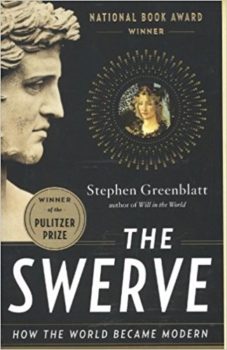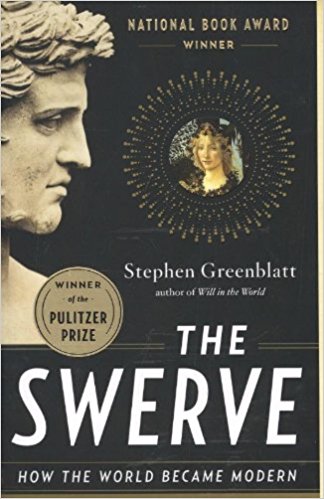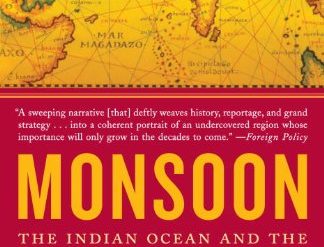
When a single book wins both the Pulitzer Prize and the National Book Award, it’s well worthwhile taking a close look. Reading historian Stephen Greenblatt‘s The Swerve makes clear what all the fuss is about.
Estimated reading time: 5 minutes
More than two thousand years ago, some five decades before the year we give the number 1, an extraordinary Roman philosopher-poet named Lucretius wrote a 7,400-line masterpiece named De rerum natura (On the Nature of Things). Lucretius was an ardent follower of the 4th-Century Greek philosopher Epicurus, and his poem is an extraordinary expression of Epicurean philosophy on life, love, sex, the pursuit of happiness, and the nature of the universe. Epicurus was one of the central figures in the Axial Age (roughly 600 to 200 BCE), which gave the world Buddha, Confucius, Socrates, Plato, and other seminal thinkers across the grand sweep of Asia and Europe.
It was Epicurus, the historian explains, who laid the foundation for science and the scientific method by his insistence that nothing should be believed unless it could be established through direct observation and logical deduction. Using this logic, he undermined the basis of all the world’s fear-based religions, asserting that the purpose of life was to seek pleasure and the absence of pain.
The Swerve: How the World Became Modern by Stephen Greenblatt (2012) 377 pages ★★★★☆
Winner of the National Book Award and the Pulitzer Prize
As Greenblatt puts it, “Jesus wept, but there were no verses that described him laughing or smiling, let alone pursuing pleasure.” Epicurus, and later Lucretius, maintained, in Greenblatt’s words, that “there is no end or purpose to existence, only endless creation and destruction, governed entirely by chance” — the random collision of atoms falling freely in the universal void. “Humans are not unique,” Epicurus contended. “We are made of the same stuff that everything else is made of” — the human soul as well as the human body, both of which perish with death. “There is no afterlife” and “All organized religions are superstitious delusions.”
Predictably, Epicurus and De rerum natura were suppressed and forgotten during Europe’s thousand-year slumber from the triumph of Christianity in the 4th Century CE until the first glimmers of the Renaissance in 14th-Century Italy. It was then, with the emergence of humanism and its obsession with recovering the brilliance of the classical past, that Epicureanism gradually re-entered the realm of intellectual discourse. As Epicurus’ 300 works had been lost irreparably but for fragments, it was the re-discovery of Lucretius’ long poem in a monastic library in Germany that helped lay the foundation for the modern world.
A work of cultural history, but much more
On one level, The Swerve is a work of cultural history, an attempt to unravel the sources of the revolutionary thinking that characterized the Renaissance. It’s also a biography, of sorts, of a remarkable man named Poggio Bracciolini, an adopted son of Florence born in humble circumstances in a nearby village late in the 14th Century. Poggio was a book-hunter, the historian explains, one of the original humanists who sought answers to life’s mysteries in the Greek and Roman classics, rejecting the dogmatic and intolerant views of the Church.
Ironically, though never a priest, Poggio made his way in the world and amassed great wealth as apostolic secretary to a succession of eight Popes, serving at the right hand of some of the Catholic Church’s most notoriously corrupt princes. At the age of 73, he finally separated himself from the Church, accepting the post of Chancellor of Florence, the city-state’s titular head, and serving for five years. Poggio died shortly after retiring from the job, living to the age of 78 in an era when life expectancy in Italy was no more than about half that many years.
The staggering influence of an ancient poem
It’s staggering to contemplate the influence of Lucretius’ poem. The themes elaborated in that extraordinary work can be found in the later writing of Sir Thomas More — Utopia portrayed a society built on Epicurean principles, with the important exception of its insistence on the eternal life of the soul in the afterlife — as well as in Giordano Bruno, Michel de Montaigne, and a passel of English writers, including Shakespeare, Spenser, Donne, and Bacon. And “Thomas Jefferson owned at least five Latin editions of On the Nature of Things, along with translations of the poem into English, Italian, and French. It was one of his favorite books, confirming his conviction that the world is nature alone and that nature consists only of matter.”
“‘I am,’ Jefferson wrote to a correspondent who wanted to know his philosophy of life, ‘an Epicurean.'”
For related reading
For another brilliant book of intellectual history, see The West: A New History in Fourteen Livesby Naoise Mac Sweeney (Debunking the myth of “Western Civilization”).
This is one of the books I’ve included in my post, Gaining a global perspective on the world around us.
You may also enjoy browsing through 20 top nonfiction books about history.
If you enjoy reading history in fictional form, check out 20 most enlightening historical novels.
If you’re looking for a broader view of human history, check out New perspectives on world history.
And you can always find my most popular reviews, and the most recent ones, on the Home Page.


























